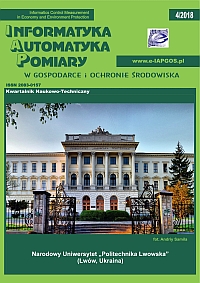MODYFIKACJE METODY P&O ŚLEDZENIA MAKSYMALNEGO PUNKTU MOCY DLA PANELU FOTOWOLTAICZNEGO
##plugins.themes.bootstrap3.article.sidebar##
Open full text
Numer Tom 8 Nr 4 (2018)
-
ŹRÓDŁA PROMIENIOWANIA W ZAKRESIE KRÓTKOFALOWYM NA PODSTAWIE HETEROWARSTW GRUP II-VI
Mikhail Slyotov, Alexey Slyotov4-7
-
ANALIZA METOD SEPARACJI WIDM OPTYCZNYCH DLA INDYWIDUALNYCH SKŁADNIKÓW
Viktor Makhniy, Oksana Kinzerska, Illia Senko8-11
-
CECHY ZARZĄDZANIA KLUCZAMI SZYFROWANIA DANYCH PRZECHOWYWANYCH W CHMURZE MS SQL AZURE
Olexander Beley12-15
-
WIELOKRYTERIALNY WYBÓR OPTYMALNYCH OPCJI PROJEKTOWYCH DLA TELEKOMUNIKACJI
Valeriy Bezruk, Daria Chebotareva, Yulia Skoryk16-19
-
OPRACOWANIE METODY POŚREDNIEGO STEGANOGRAFICZNEGO UKRYWANIA DANYCH W INFORMACJI O KONTURZE
Volodymyr Barannik, Oleg Shatun, Dmitriy Barannik, Veronika Kobtseva20-23
-
ZASTOSOWANIE METOD STEGANOGRAFICZNYCH DO ATAKÓW W SYSTEMACH INFORMACYJNO-KOMUNIKACYJNYCH
Anna Romanova, Sergiy Toliupa24-27
-
BUDOWA SYSTEMÓW WYKRYWANIA ATAKÓW NA PODSTAWIE METOD INTELIGENTNEJ ANALIZY DANYCH
Serhii Toliupa, Mykola Brailovskyi, Ivan Parkhomenko28-31
-
PRZEGLĄD ZASTOSOWAŃ KONSTRUKCJI Z PRZEWODÓW W URZĄDZENIACH RADIOWYCH
Mykola Khobzei, Dmytro Vovchuk, Magdalena Michalska32-35
-
POPRAWA JAKOŚCI KLASYFIKACJI OBIEKTÓW RUCHOMYCH W SYSTEMACH ALARMOWYCH Z WYKORZYSTANIEM CZUJNIKÓW SEJSMICZNYCH
Bohdan Volochiy, Mykhailo Zmysnyi, Leonid Ozirkovskyy, Volodymyr Onyshchenko, Yuriy Salnyk36-39
-
ALGORYTMICZNE SYSTEMY WSPARCIA BEZZAŁOGOWYCH STATKÓW POWIETRZNYCH I CECHY STRUKTURY POKŁADOWYCH SYSTEMÓW NAWIGACYJNYCH
Mykola Mykyjchuk, Volodymyr Markiv40-43
-
METODA BEZPIECZNEGO LĄDOWANIA AWARYJNEGO KWADROKOPTERA
Bohdan Blagitko, Yuriy Mochulsky44-47
-
POPRAWA METOD KOMPENSACJI RUCHU PORUSZAJĄCYCH SIĘ OBIEKTÓW DYNAMICZNYCH W STREAMIE WIDEO SYSTEMU WIDEOKONFERENCYJNEGO
Volodymyr Barannik, Mykola Dvorsky, Valeriy Barannik, Viktoria Himenko, Anton Sorokun48-51
-
SYSTEM INFORMACYJNY DO OCENY ZŁOŻONOŚCI DZIAŁALNOŚCI ZAWODOWEJ – TEORETYCZNE I PRAKTYCZNE ASPEKTY WDROŻENIA
Oleg Zaritskyi52-55
-
ZJAWISKO INFLUENCJI SŁONECZNYCH W SATELITARNYCH SYSTEMACH GEO W ASPEKCIE PROPAGACJI FAL RADIOWYCH
Jacek Łukasz Wilk-Jakubowski56-59
-
WPŁYW ALGORYTMÓW STEROWANIA ROBOTEM MOBILNYM NA PROCES UNIKANIA PRZESZKÓD
Piotr Wójcicki, Paweł Powroźnik, Kamil Żyła, Stanisław Grzegórski60-63
-
MODYFIKACJE METODY P&O ŚLEDZENIA MAKSYMALNEGO PUNKTU MOCY DLA PANELU FOTOWOLTAICZNEGO
Piotr Kozierski, Adam Owczarkowski, Marcin Lis, Dariusz Horla64-67
Archiwum
-
Tom 10 Nr 4
2020-12-20 16
-
Tom 10 Nr 3
2020-09-30 22
-
Tom 10 Nr 2
2020-06-30 16
-
Tom 10 Nr 1
2020-03-30 19
-
Tom 9 Nr 4
2019-12-16 20
-
Tom 9 Nr 3
2019-09-26 20
-
Tom 9 Nr 2
2019-06-21 16
-
Tom 9 Nr 1
2019-03-03 13
-
Tom 8 Nr 4
2018-12-16 16
-
Tom 8 Nr 3
2018-09-25 16
-
Tom 8 Nr 2
2018-05-30 18
-
Tom 8 Nr 1
2018-02-28 18
-
Tom 7 Nr 4
2017-12-21 23
-
Tom 7 Nr 3
2017-09-30 24
-
Tom 7 Nr 2
2017-06-30 27
-
Tom 7 Nr 1
2017-03-03 33
-
Tom 6 Nr 4
2016-12-22 16
-
Tom 6 Nr 3
2016-08-08 18
-
Tom 6 Nr 2
2016-05-10 16
-
Tom 6 Nr 1
2016-02-04 16
##plugins.themes.bootstrap3.article.main##
DOI
Authors
Abstrakt
W artykule przedstawiono metodę zaburzania i obserwacji P&O do śledzenia maksymalnego punktu mocy. Zaproponowano trzy modyfikacje metody, dzięki którym efektywność śledzenia jest zadowalająca, nawet dla bardzo szybkich oraz zaszumionych zmian irradiancji.
Słowa kluczowe:
Bibliografia
Abdullah M. A., Yatim A. H. M., Tan C. W.: A study of maximum power point tracking algorithms for wind energy system. In Clean Energy and Technology (CET), 2011 IEEE First Conference, 321–326.
Ahmed J., Salam Z.: A modified P&O maximum power point tracking method with reduced steady-state oscillation and improved tracking efficiency. IEEE Transactions on Sustainable Energy 4/2016, 1506–1515.
Chung T. M., Daniyal H., Sulaiman M. H., Bakar M. S.: Comparative study of P&O and modified incremental conductance algorithm in solar maximum power point tracking. In 4th IET Clean Energy and Technology Conference (CEAT) 11/2016, 5.
Gaur P., Verma Y. P., Singh P.: Maximum power point tracking algorithms for photovoltaic applications: A comparative study. In Recent Advances in Engineering & Computational Sciences (RAECS), 2nd International Conference 12/2015, 5.
Hohm D. P., Ropp M. E.: Comparative study of maximum power point tracking algorithms. Progress in photovoltaics: Research and Applications 1/2003, 47–62 [doi: 10.1002/pip.459].
Hussein K. H., Muta I., Hoshino T., Osakada M.: Maximum photovoltaic power tracking: an algorithm for rapidly changing atmospheric conditions. IEE Proceedings-Generation, Transmission and Distribution 1/1995, 59–64.
Jung Y., So J., Yu G., Choi J.: Improved perturbation and observation method (IP&O) of MPPT control for photovoltaic power systems. In Photovoltaic Specialists Conference, Conference Record of the Thirty-first IEEE 01/2005, 1788–1791.
Lasheen M. A., Bendary F. M., Sharaf M., El-Zoghby H. M.: Maximum power point tracking of a wind turbine driven by synchronous generator connected to an isolated load using genetic algorithm. In Smart Grid Conference (SASG), Saudi Arabia 12/2014, 1–9.
Liu C., Wu B., Cheung R.: Advanced algorithm for MPPT control of photovoltaic systems. In Canadian Solar Buildings Conference, Montreal 08/2004, 20–24.
More D. N., Naik A. V., Kumar V. C.: Maximum power point using P&O technique for photovoltaic system. In Technological Innovations in ICT for Agriculture and Rural Development (TIAR) 04/2017, 134–137.
Seyedmahmoudian M., Horan B., Rahmani R., Maung Than Oo A., Stojcevski A.: Efficient photovoltaic system maximum power point tracking using a new technique. Energies 147(9)/2016, 1–18.
Surma P.: Porównanie metod MPPT paneli fotowoltaicznych (P&O, IC, Fuzzy Logic) w środowisku Matlab Simulink. Przegląd Elektrotechniczny 1/2014, 66–69.
Van T. L., Nguyen D. Q., Duy V. H., Nguyen H.: Fast Maximum Power Point Tracking Control for Variable Speed Wind Turbines. In International Conference on Advanced Engineering Theory and Applications 12/2017, 821–829.
Zaremba A., Rodziewicz T., Wacławek M.: Algorytmy śledzenia punktu mocy maksymalnej (MPPT) w systemach fotowoltaicznych. Proceedings of ECOpole 2/2012, 805–810 [doi: 10.2429/proc.2012.6(2)112].
##plugins.themes.bootstrap3.article.details##
Abstract views: 320
Licencja

Utwór dostępny jest na licencji Creative Commons Uznanie autorstwa – Na tych samych warunkach 4.0 Miedzynarodowe.






